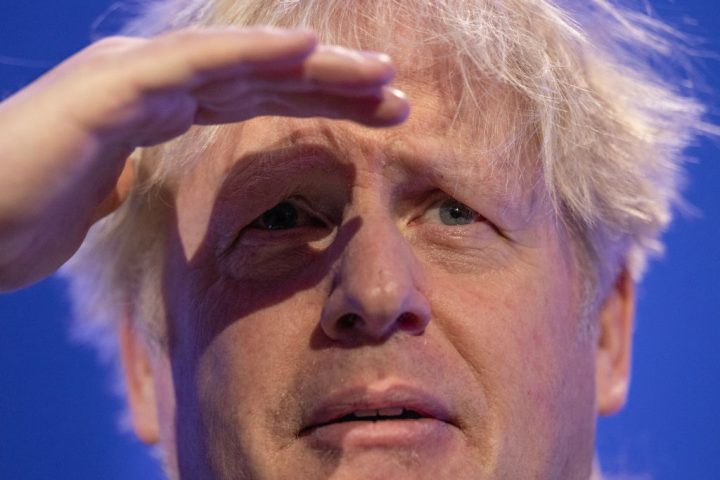Last night, Boris Johnson unexpectedly resigned from the House of Commons. His graceless and indignant resignation statement made clear that he blamed the Privileges Committee for his departure, arguing that he had been forced out of parliament over partygate.
The committee had written to Mr Johnson in advance of the publication of its report, outlining its proposed criticisms. It seems pretty clear that Johnson seems to have jumped before he was pushed. Yet, if one looks more closely at Johnson’s account of events, it contains a some significant inaccuracies which go far beyond the usual rough and tumble of politics.
Johnson’s decision to stand down is a tacit admission that he had no confidence that he would be backed by his own party
Johnson argued that the Privileges Committee was conducting a ‘political hit job’ and described it as a ‘kangaroo court’. He also claimed that he had ‘no formal ability to challenge anything they say’.
But it is important to recall that the committee has a cross-party membership with a Conservative majority. Moreover, it has no power to remove Johnson from parliament. Its report would merely have been the opening stage of a multi-part process.
Any recommendation that the committee made to impose sanctions on Johnson would have needed to be endorsed by the House of Commons. Had he not quit, Johnson and his remaining allies would have had the opportunity to debate the recommendation, propose amendments and vote on the sanction. The Commons, which still retains a large majority of Conservative MPs, would have determined whether any punishment should be imposed on him. Far from being ‘forced out of parliament by a tiny handful of people’, Johnson’s decision to stand down is a tacit admission that he had no confidence that he would be backed by his own party.
Even if the Commons determined that Johnson should be suspended for 10 days or more, ultimately, if a recall petition eventually resulted in a by-election, it would have been for Johnson’s constituents in Uxbridge and South Ruislip to decide his fate. Far from being anti-democratic, the process includes a robust democratic safeguard.
It was only days ago that some of Johnson’s outriders in the media were pointing to polling which suggested that Johnson would comfortably hold his seat in such an event. It seems that Johnson himself was not so confident and may have wished to save himself the humiliation of an electoral defeat.
Johnson’s attacks on the Privileges Committee were damaging. Throughout the investigation he and his allies criticised the committee, claiming that it was biased. From the off it appeared that their main tactic was to try to discredit the it and undermine its proceedings, with no regard to the consequences. This attempt to damage the legitimacy of the committee and the process was disreputable and potentially counterproductive. It was clear at the hearing that some MPs, such as Sir Charles Walker, were visibly angry about Johnson’s tactics.
Nonetheless, Johnson doubled down on this approach in his resignation statement, claiming that the committee’s report reeked of prejudice and that the process was ‘unjust’. However, the committee presented Johnson with all the evidence against him in advance and held a public hearing at which Johnson was able to make his case.
Johnson is plainly trying to create his own narrative of betrayal. The public will have to draw its own conclusions once the committee’s report is made public – although it seems unlikely that many minds will be changed given the polarising nature of Johnson’s approach.
The accusation against Johnson was significant. The frequent references to ‘partygate’ trivialise the matter and obscures the fact he was actually accused of either deliberately or recklessly misleading parliament. This is important: if it were to emerge that ministers suspected of lying to parliament could do so with impunity, it would undermine parliament’s ability to hold the government to account.
Therefore, we should be thankful that the committee was able to investigate this matter in such an effective fashion. In many ways it is quite remarkable that a select committee could trigger the resignation of a former prime minister in circumstances when his party is still in power. While the UK’s constitutional arrangements are often criticised, this process demonstrates that parliament does matter and can hold the powerful to account.
Instead of facing his critics head on, the former prime minister has now left in a sulk, blaming everyone but himself. The manner of his departure is likely to leave an indelible stain on his reputation.
It will not prevent the publication of a critical report by the committee. Indeed the committee has already indicated that it will conclude its inquiry on Monday and ‘publish its report promptly’. A spokesperson for the committee noted that ‘Mr Johnson has departed from the processes of the House and has impugned the integrity of the House by his statement’. In seeking to circumvent these process by resigning, Johnson has arguably only further damaged his standing.
Johnson’s statement says that it is very sad to be leaving parliament ‘at least for now’. Clearly he believes that he might make yet another comeback once the dust has settled. Nevertheless, most will conclude that politician formerly known as ‘the greased piglet’ may have finally exhausted his luck.






Comments